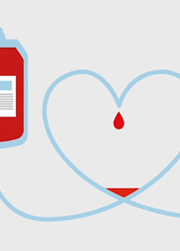
Blood Donation - Why should we do it?
18 Aug 2021Blood donation is a voluntary action that helps in saving other human lives. There are many kinds of blood donations, addressing multiple medical requirements.
Whole Blood Donation
It is a prevalent kind of blood donation, wherein the individual donates half a litre of whole blood. The blood is then segregated into components like red cells, plasma, and occasionally platelets.
Apheresis
At the time of apheresis, the individual is attached to a machine that would collect and separate blood components, including red cells, plasma and platelets, while returning unused components.
Plateletpheresis
It collects platelets – the cells that support preventing bleeding by clotting in blood vessels. Donated platelets are usually given to individuals with clotting issues, cancer patients, and patients requiring organ transplants or critical surgeries.
Double Red Cell Donation
It helps to donate a concentrated quantity of red blood cells, provided to individuals with severe blood loss, like accident victims or those suffering from sickle cell anaemia.
Plasmapheresis
It collects the plasma, which helps blood clot and consists of antibodies that fight against infections. Plasma is usually given to individuals during emergency and trauma circumstances to stop bleeding.
Why Is Blood Donation Made?
Across the globe, people require blood transfusions every day, from surgery to accident victims to those suffering from a disease. Donating your blood would help another individual; there is no replacement for human blood.
Benefits of Blood Donation
Donating blood is beneficial in preventing and decreasing heart attacks, cancer, Hemochromatosis, and liver ailment. By donating blood, you maintain the iron level in the body and thereby reduce health risks.
- The body produces new blood cells and ensures good health
- Blood donation assists in weight loss and burning fat
- An individual donating blood would feel less stressful
- Blood donation accelerates the process of wound healing
- An individual can maintain a lower cholesterol level
- A person willing to donate blood can access a cost-free medical check-up
- Research indicates that those involved in altruistic work live a longer life
- It can uplift an individual psychologically
- Blood donated is stored in a blood bank
Risks Associated With Blood Donation
Blood donation is safe. Advanced sterile disposable equipment is used for every donor. Hence, there is no risk of contracting any blood-borne infection while donating blood.
A healthy adult can easily donate around half a litre of blood without any harmful impact on the health. In just a few days, the body replaces the lost fluids. And, after two weeks, the body replaces the lost red blood cells.
Preparing For Blood Donation
- Sound health, passing all physical and health-history examinations
- Around 50 kilograms
- Sleep well on the night before you plan to donate
- Have a healthy meal, do not consume fatty foods
- Drink lots of water before the donation
- Verify if any medication you had taken recently will prevent you from donating
Mandatory Procedures
Before The Donation
Before donating blood, you would have to fill out a confidential medical history with queries regarding behaviors known to carry a higher risk of blood-borne infections.
After The Procedure
After donating, you will be placed under observation, where you can relax and consume light snacks. If you do not have any adverse reactions, you can leave in 15 minutes.
- Drink a significant amount of fluids
- Avoid strenuous physical exercise
- Apply cold pack for any bruising
Humans have not found a way of producing blood in labs. It can be available from generous donors and blood donation is a wonderful gesture to help others and serve the community. There are several health issues like hypertension, cancer, diabetes, and kidney problems that may not be diagnosed till a later stage. Taking care of your health is vital to avoid spreading any disease.
